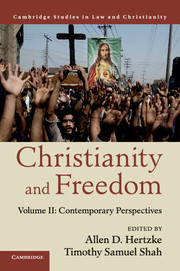Book contents
- Frontmatter
- Colophon
- Contents
- Contributing Authors
- Acknowledgments
- Introduction: Christianity and Freedom in the Contemporary World
- 1 Persecution in the Context of Religious and Christian Demography, 1970–2020
- 2 Patterns and Purposes of Contemporary Anti-Christian Persecution
- 3 Where the Spirit Leads: Global Pentecostalism and Freedom
- 4 Christianity among the Marginalized: Empowering Poor Women in India
- 5 Transnational Christian Networks for Human Dignity
- 6 The Growth and Dynamism of Chinese Christianity
- 7 Christianity and Religious Freedom in Indonesia since 1998
- 8 Christianity and Freedom in India: Colonialism, Communalism, Caste, and Violence
- 9 Vietnam: Christianity's Contributions to Freedoms and Human Flourishing in Adversity
- 10 The Challenge and Leaven of Christianity in Pakistan
- 11 Christianity and the Challenge of Religious Violence in Northern Nigeria
- 12 Copts of Egypt: Defi ance, Compliance, and Continuity
- 13 Between the Hammer and the Anvil: Indigenous Palestinian Christianity in the West Bank
- 14 Christians in the State of Israel: Between Integration and Emigration
- 15 Arab Muslim Attitudes toward Religious Minorities
- 16 They That Remain: Syrian and Iraqi Christian Communities amid the Syria Confl ict and the Rise of the Islamic State
- Index
4 - Christianity among the Marginalized: Empowering Poor Women in India
Published online by Cambridge University Press: 05 February 2016
- Frontmatter
- Colophon
- Contents
- Contributing Authors
- Acknowledgments
- Introduction: Christianity and Freedom in the Contemporary World
- 1 Persecution in the Context of Religious and Christian Demography, 1970–2020
- 2 Patterns and Purposes of Contemporary Anti-Christian Persecution
- 3 Where the Spirit Leads: Global Pentecostalism and Freedom
- 4 Christianity among the Marginalized: Empowering Poor Women in India
- 5 Transnational Christian Networks for Human Dignity
- 6 The Growth and Dynamism of Chinese Christianity
- 7 Christianity and Religious Freedom in Indonesia since 1998
- 8 Christianity and Freedom in India: Colonialism, Communalism, Caste, and Violence
- 9 Vietnam: Christianity's Contributions to Freedoms and Human Flourishing in Adversity
- 10 The Challenge and Leaven of Christianity in Pakistan
- 11 Christianity and the Challenge of Religious Violence in Northern Nigeria
- 12 Copts of Egypt: Defi ance, Compliance, and Continuity
- 13 Between the Hammer and the Anvil: Indigenous Palestinian Christianity in the West Bank
- 14 Christians in the State of Israel: Between Integration and Emigration
- 15 Arab Muslim Attitudes toward Religious Minorities
- 16 They That Remain: Syrian and Iraqi Christian Communities amid the Syria Confl ict and the Rise of the Islamic State
- Index
Summary
Christ gave me a pagri [a turban, which is a symbol of respect], in place of dust.
Lal Begri, Dalit convert in Pasrur, 1933I tried to kill myself three times. A sister took me to church. I met Jesus. I am here today.
Maliga, Dalit convert in Baglur Slum, Bangalore, 2013One cannot help but notice the extent to which terms such as “hope,” “self-control,” and “dignity” – words with an unmistakable religious resonance and valence – have moved to the center of discussion on economic development and poverty alleviation. With the rise in behavioral economics and broader notions of human development and deprivation, it is no longer unusual for major economists to address these topics in their lectures, books, and leading economics journals. It is equally striking, however, that these concepts appear to float freely of any reference to or grounding in religious tradition or community. Indeed, while there is a growing openness to the economic importance of issues of identity, dignity, hope, and self-control, there has not been a parallel openness to the economic importance of religion per se or of specifically religious beliefs, practices, and communities.
For many of the world's poor the indignity and stigma that they face may be a result of their outcaste status and religious identity. Poverty can mean more than being simply materially or physically deprived; it can also mean being deprived of self-respect, dignity, and self-worth in ways and for reasons that are not reducible to material factors. Therefore, indicators that primarily assess material and physical dimensions of deprivation are woefully inadequate to gauge the complete emotional, psychological, and spiritual impoverishment the poor in various parts of the world deal with every day.
For these reasons, the economist Glenn Loury emphasizes social ties and relationships are integrally and constitutively important for development. He argues that orthodox models of human capital were too individualistic and focused on an individual's human capital accumulation, and do not take into account the spiritual and social context in which that individual was embedded. Loury maintains that any understanding of human capital development – and of human and economic development more broadly – must be viewed in relational terms.
- Type
- Chapter
- Information
- Christianity and Freedom , pp. 107 - 132Publisher: Cambridge University PressPrint publication year: 2016



